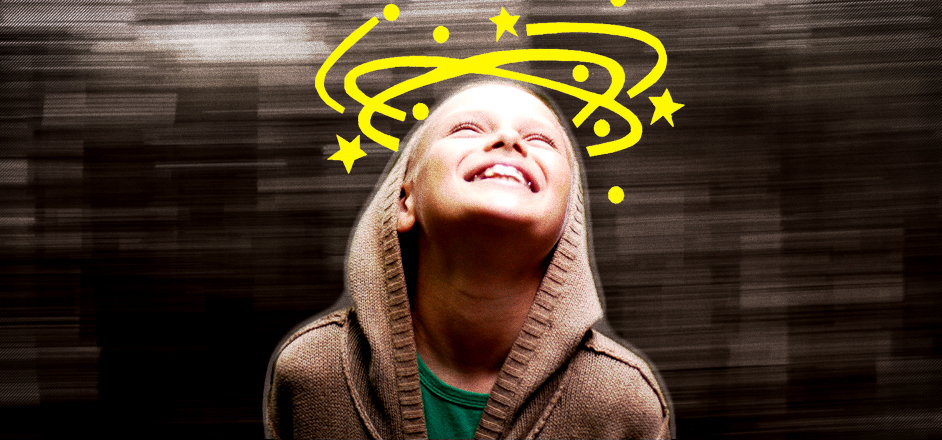This is a story about kids getting fucked up by spinning and passing out. But let's be upfront about why we're all here: we are all adults who like to alter our state of mind — on booze or weed or erotic asphyxiation — and we want to read about kids changing their consciousness as an exercise in self-justification, because it proves we're not degenerates, and that our desire to get fucked up is normal and inborn. Because kids aren't criminals, they're not trying to be assholes — they're just doing what nature tells them to do.
"Anyone who watches young children without revealing his presence will find them regularly practicing techniques that induce striking changes in mental states," writes Dr. Andrew Weil, an expert of both health and drugs, in his book "The Natural Mind: A New Way of Looking at Drugs and the Higher Consciousness."
"Three and four year olds, for example, commonly whirl themselves into vertiginous stupors," he writes. "They hyperventilate and have other children squeeze them around the chest until they faint. They also choke each other to produce loss of consciousness."
Stated clearly: no matter what your mom says, almost no academic thinks you're a fuck-up just because you like to get fucked up.
Altering consciousness — whether through whirling or mimosas or purple kush — might be "the fourth human drive," as basic and unstoppable as the drives of hunger, thirst and sex, says Professor Caroline S. Conzelman, who teaches drug policy at CU Boulder.
Altering consciousness might be "linked to our very survival as a species," Conzelman says via email. "It's an amazing concept."
Yet, most people don't see it like that. When most people see kids acting like this, they freak.
In regards to the "choking game," where kids get a rush from passing out, newspapers write like it's the latest drug craze, moms panic and D.A.R.E. makes choking game education part of the curriculum . About kids spinning until they're dizzy, a parent asked for advice on whether her 7-month-old daughter should be allowed to spin, and a woman posted on Facebook that her 9-year-old son spun so fast on a tire swing "he popped blood vessels in face" and "his face swelled up, his eyes swelled up, his nose bled, and he is suffering from a concussion." Maybe D.A.R.E. should include swings in its curriculum.
"The sight of a child being throttled into unconsciousness scares the parent," Weil writes, "but the child seems to have a wonderful time; at least, he goes right off and does it again."
In this, Weil sees a connection between the behavior of kids and of adults. He himself talks about loving spinning, huffing cleaning fluid, and how impressed he was with the anesthesia that knocked him out during a tonsillectomy. "Use of illegal drugs is nothing more than logical continuations of a development going back to early childhood … a real drive arising from the neurophysiological structure of the human brain," he writes. The same drive that pushed him toward cleaning fluid pushed him toward mescaline, which he lauded before he got into herbs.
Ronald K. Siegel, Jr., a respected psychopharmacologist, wrote a book on "the universal drive for mind-altering substances." Mostly, he proved that almost any organism likes feeling different. Siegal sat in a cage with monkeys and taught them how to smoke crack cocaine. His findings suggest that monkeys would smoke crack all day if they had a connect.
Why would monkey society want this? The evolutionary advantage is clear with certain mind-altering substances. Coffee lets you work longer and harder, boosting the economy. Booze lets you connect with friends and talk to hotties, boosting population. With other things, like heroin, the advantages aren't clear. There may be none. Evolution isn't perfect.
At this point, we can hear everyone saying: "See! My habit of blacking out drunk/dabbing at work/cranking all night is as innocent as a kid on a playground choking out his little sister."
Choking out his little sister?
There's the point. Altering consciousness is natural, but not everything that's natural is beneficial in all quantities, at all times. Eating is natural, too, but if you eat all day your gut will hang over your dick. If you alter your consciousness all day, it's tough to work and socialize and go to town council meetings.
As Aldous Huxley wrote, "That humanity at large will ever be able to dispense with Artificial Paradises seems very unlikely." But Artificial Paradises can't be worthless. And they aren't. As Weil wrote, "Altered states of consciousness have great potential for strongly positive psychic development."
Which gets us back to Conzelman's point: maybe kids develop through this stuff. Spinning and getting dizzy, for example, might help kids train their balance systems, experts speculate. Maybe these are all ways for kids to get to know themselves and push their own limits; to see what they can handle.
And so rather than using this knowledge — that kids like to get fucked up — to blindly justify your own repeated debauchery, maybe use it to ask yourself an honest question: why are you getting twisted? For positive psychic development? To connect with friends? … Or as an escape from your problems? To mask some fear of yours?
Then, once you know the why, and you're OK with it, go ahead. Act like a child again, and get a little brainless.





Leave a Reply
You must be logged in to post a comment.